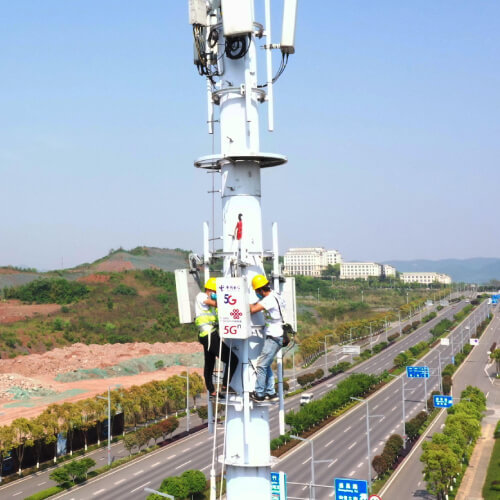
Having engineered the world's biggest 5G rollout, Chinese operators are now building out enterprise 5G at a rapid rate (see China has more than 5K 5G private networks).
They've deployed 6,518 private 5G networks, up from 1,655 a year ago, according to a 'top ten' list compiled by Communications World website.
That total includes 1,000 smart factories, 200 smart mines, 180 smart grids, 89 ports, and 600 leading hospitals, between them supporting some 20,000 applications.
Here are some of the highlights:
China's biggest 5G private network
CATL, the largest lithium-ion battery-maker on the planet, also operates China's and possibly the world's biggest 5G private network, covering more than 5 million square meters in factories across six provinces.
Figure 1:  Chinese operators have deployed 6,518 private 5G networks, up from 1,655 a year ago.
Chinese operators have deployed 6,518 private 5G networks, up from 1,655 a year ago.
(Source: Wang Quanchao/Xinhua/Alamy Live News)
The company has a third of the global EV battery market, counting Tesla, BMW, Toyota and Honda among its customers.
Its 5G enterprise network, installed by China Mobile and Huawei at seven sites, runs applications including centralized process control, AI-based video streaming quality inspection, big data real-time detection and smart logistics. CATL plans to adapt the network and applications soon to its factories worldwide.
Expanded medical care
A 5G smart healthcare network integrating MEC and AI, built by China Unicom and Huawei, has expanded medical care reach and efficiency across the tropical province of Hainan.
The partners deployed telemedicine equipment in every city and county hospital, in 340 township health centers and 2693 village clinics. The network supports remote and AI-assisted consultations and diagnosis.
Average waiting time for patients has reduced by two-fifths and the efficiency of medical treatment has been increased by 30%.
Digital museum and cultural platform
Mobile and ZTE have worked with cultural exchange firm DTXS Silk Road to create a digital exhibition and trading platform for artworks and cultural assets in China's northwest, home to the ancient capital of Xi'an.
Using 5G, XR, blockchain and the cloud, they have digitized 1,200 cultural relics, built a digital cultural park and a metaverse museum and provided a secure platform that supports digital asset exhibition and trading.
Better rice crops
Rice production increased by between 5%-20% in a reference project carried out by China Telecom, using AI analysis to guide planting and smart machinery to replace manual labor and enabling farmers to improve their efficiency and their incomes.
The telco is now applying the technologies to other smart agricultural projects across China, including sheep and hog farms and citrus production.
Automated ports
ZTE and China Unicom have jointly automated Tianjin port, one of the world's ten largest, with a 5G private network that allows intelligent unmanned services such as remote crane operation and the world's first "one-click container loading."
Since the network was deployed in 2019, the port has improved overall efficiency by 20%, cut operating costs by 10% and reduced energy consumption per container by 20%.
In Kunming in the southwest, China Unicom is building a 5G network for the Tengjun inland port smart logistics park.
Want to know more? Sign up to get our dedicated newsletters direct to your inbox.
The low latency network covers a 12,000-square-meter warehouse, enabling 90 automatic guided vehicle (AGV) storage robots to carry out the sorting, transport and storage of all goods.
Port management believe that the network will raise efficiency by 30% and reduce personnel by 70%.
Related posts:
– Robert Clark, contributing editor, special to Light Reading
Read more about:
AsiaAbout the Author(s)
You May Also Like











